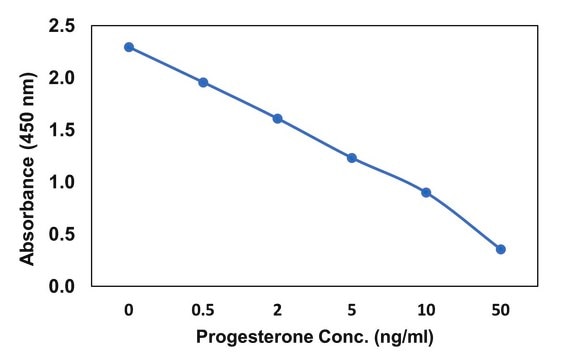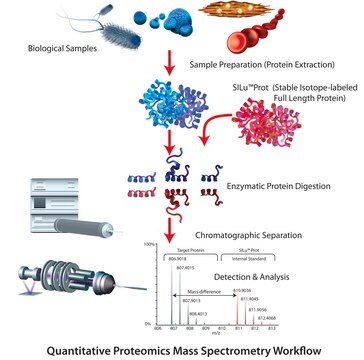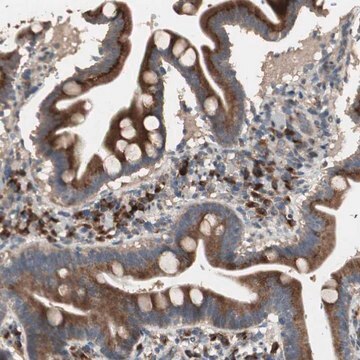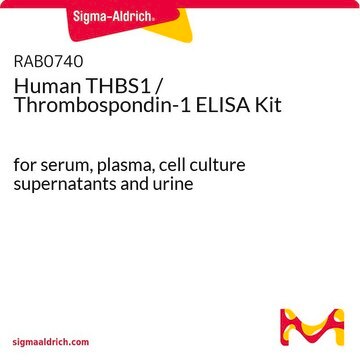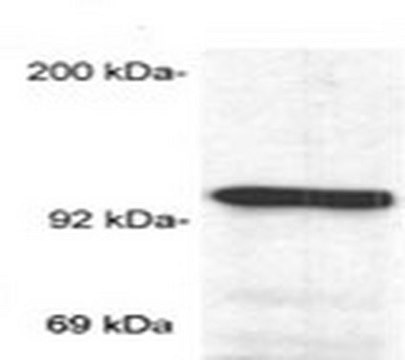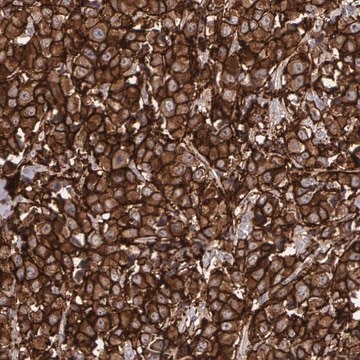SAB1401385
Anti-THBS1 antibody produced in mouse
purified immunoglobulin, buffered aqueous solution
Sign Into View Organizational & Contract Pricing
All Photos(3)
About This Item
UNSPSC Code:
12352203
NACRES:
NA.41
Recommended Products
biological source
mouse
Quality Level
conjugate
unconjugated
antibody form
purified immunoglobulin
antibody product type
primary antibodies
clone
polyclonal
form
buffered aqueous solution
species reactivity
human
technique(s)
immunofluorescence: suitable
western blot: 1 μg/mL
NCBI accession no.
UniProt accession no.
shipped in
dry ice
storage temp.
−20°C
target post-translational modification
unmodified
Gene Information
human ... THBS1(7057)
General description
The protein encoded by this gene is a subunit of a disulfide-linked homotrimeric protein. This protein is an adhesive glycoprotein that mediates cell-to-cell and cell-to-matrix interactions. This protein can bind to fibrinogen, fibronectin, laminin, type V collagen and integrins α-V/β-1. This protein has been shown to play roles in platelet aggregation, angiogenesis, and tumorigenesis. (provided by RefSeq)
Thrombospondin 1 (THBS1/TSP1) is encoded by the gene mapped to human chromosome 15q14. It is a matricellular glycoprotein and can be secreted by many cells.
Immunogen
THBS1 (NP_003237.2, 1 a.a. ~ 1170 a.a) full-length human protein.
Sequence
MGLAWGLGVLFLMHVCGTNRIPESGGDNSVFDIFELTGAARKGSGRRLVKGPDPSSPAFRIEDANLIPPVPDDKFQDLVDAVRAEKGFLLLASLRQMKKTRGTLLALERKDHSGQVFSVVSNGKAGTLDLSLTVQGKQHVVSVEEALLATGQWKSITLFVQEDRAQLYIDCEKMENAELDVPIQSVFTRDLASIARLRIAKGGVNDNFQGVLQNVRFVFGTTPEDILRNKGCSSSTSVLLTLDNNVVNGSSPAIRTNYIGHKTKDLQAICGISCDELSSMVLELRGLRTIVTTLQDSIRKVTEENKELANELRRPPLCYHNGVQYRNNEEWTVDSCTECHCQNSVTICKKVSCPIMPCSNATVPDGECCPRCWPSDSADDGWSPWSEWTSCSTSCGNGIQQRGRSCDSLNNRCEGSSVQTRTCHIQECDKRFKQDGGWSHWSPWSSCSVTCGDGVITRIRLCNSPSPQMNGKPCEGEARETKACKKDACPINGGWGPWSPWDICSVTCGGGVQKRSRLCNNPTPQFGGKDCVGDVTENQICNKQDCPIDGCLSNPCFAGVKCTSYPDGSWKCGACPPGYSGNGIQCTDVDECKEVPDACFNHNGEHRCENTDPGYNCLPCPPRFTGSQPFGQGVEHATANKQVCKPRNPCTDGTHDCNKNAKCNYLGHYSDPMYRCECKPGYAGNGIICGEDTDLDGWPNENLVCVANATYHCKKDNCPNLPNSGQEDYDKDGIGDACDDDDDNDKIPDDRDNCPFHYNPAQYDYDRDDVGDRCDNCPYNHNPDQADTDNNGEGDACAADIDGDGILNERDNCQYVYNVDQRDTDMDGVGDQCDNCPLEHNPDQLDSDSDRIGDTCDNNQDIDEDGHQNNLDNCPYVPNANQADHDKDGKGDACDHDDDNDGIPDDKDNCRLVPNPDQKDSDGDGRGDACKDDFDHDSVPDIDDICPENVDISETDFRRFQMIPLDPKGTSQNDPNWVVRHQGKELVQTVNCDPGLAVGYDEFNAVDFSGTFFINTERDDDYAGFVFGYQSSSRFYVVMWKQVTQSYWDTNPTRAQGYSGLSVKVVNSTTGPGEHLRNALWHTGNTPGQVRTLWHDPRHIGWKDFTAYRWRLSHRPKTGFIRVVMYEGKKIMADSGPIYDKTYAGGRLGLFVFSQEMVFFSDLKYECRDP
Sequence
MGLAWGLGVLFLMHVCGTNRIPESGGDNSVFDIFELTGAARKGSGRRLVKGPDPSSPAFRIEDANLIPPVPDDKFQDLVDAVRAEKGFLLLASLRQMKKTRGTLLALERKDHSGQVFSVVSNGKAGTLDLSLTVQGKQHVVSVEEALLATGQWKSITLFVQEDRAQLYIDCEKMENAELDVPIQSVFTRDLASIARLRIAKGGVNDNFQGVLQNVRFVFGTTPEDILRNKGCSSSTSVLLTLDNNVVNGSSPAIRTNYIGHKTKDLQAICGISCDELSSMVLELRGLRTIVTTLQDSIRKVTEENKELANELRRPPLCYHNGVQYRNNEEWTVDSCTECHCQNSVTICKKVSCPIMPCSNATVPDGECCPRCWPSDSADDGWSPWSEWTSCSTSCGNGIQQRGRSCDSLNNRCEGSSVQTRTCHIQECDKRFKQDGGWSHWSPWSSCSVTCGDGVITRIRLCNSPSPQMNGKPCEGEARETKACKKDACPINGGWGPWSPWDICSVTCGGGVQKRSRLCNNPTPQFGGKDCVGDVTENQICNKQDCPIDGCLSNPCFAGVKCTSYPDGSWKCGACPPGYSGNGIQCTDVDECKEVPDACFNHNGEHRCENTDPGYNCLPCPPRFTGSQPFGQGVEHATANKQVCKPRNPCTDGTHDCNKNAKCNYLGHYSDPMYRCECKPGYAGNGIICGEDTDLDGWPNENLVCVANATYHCKKDNCPNLPNSGQEDYDKDGIGDACDDDDDNDKIPDDRDNCPFHYNPAQYDYDRDDVGDRCDNCPYNHNPDQADTDNNGEGDACAADIDGDGILNERDNCQYVYNVDQRDTDMDGVGDQCDNCPLEHNPDQLDSDSDRIGDTCDNNQDIDEDGHQNNLDNCPYVPNANQADHDKDGKGDACDHDDDNDGIPDDKDNCRLVPNPDQKDSDGDGRGDACKDDFDHDSVPDIDDICPENVDISETDFRRFQMIPLDPKGTSQNDPNWVVRHQGKELVQTVNCDPGLAVGYDEFNAVDFSGTFFINTERDDDYAGFVFGYQSSSRFYVVMWKQVTQSYWDTNPTRAQGYSGLSVKVVNSTTGPGEHLRNALWHTGNTPGQVRTLWHDPRHIGWKDFTAYRWRLSHRPKTGFIRVVMYEGKKIMADSGPIYDKTYAGGRLGLFVFSQEMVFFSDLKYECRDP
Application
Anti-THBS1 antibody produced in mouse has been used in western-blot analysis.
Biochem/physiol Actions
Thrombospondin 1 (THBS1/TSP1) is believed to play a role in cell migration and proliferation, during embryogenesis and wound repair. THBS1 expression is highly regulated by different hormones and cytokines and is developmentally controlled. THBS1 stimulates the growth of vascular smooth muscle cells and human foreskin fibroblasts. A combination of IFN-γ (interferon gamma) and TNF-α (tumor necrosis factor alpha) inhibits THBS1 production in these cells. It also exhibits antiangiogenic properties and regulates immune processes. THBS1 binds to various cell surface receptors, such as integrins associated protein CD47. It also plays a crucial role in inflammatory processes and post-inflammatory tissue dynamics. TSP1 has been used as a potential regulator of tumor growth and metastasis. It is upregulated in rheumatoid synovial tissues and might be associated with rheumatoid arthritis. Variants of this gene might be linked with increased risk of autism.
Physical form
Solution in phosphate buffered saline, pH 7.4
Disclaimer
Unless otherwise stated in our catalog or other company documentation accompanying the product(s), our products are intended for research use only and are not to be used for any other purpose, which includes but is not limited to, unauthorized commercial uses, in vitro diagnostic uses, ex vivo or in vivo therapeutic uses or any type of consumption or application to humans or animals.
Not finding the right product?
Try our Product Selector Tool.
flash_point_f
Not applicable
flash_point_c
Not applicable
Certificates of Analysis (COA)
Search for Certificates of Analysis (COA) by entering the products Lot/Batch Number. Lot and Batch Numbers can be found on a product’s label following the words ‘Lot’ or ‘Batch’.
Already Own This Product?
Find documentation for the products that you have recently purchased in the Document Library.
Nitric oxide regulates angiogenesis through a functional switch involving thrombospondin-1.
Ridnour LA, et al.
Proceedings of the National Academy of Sciences of the USA, 102(37), 13147-13152 (2005)
Increased expression of thrombospondin-1 in vessel wall of diabetic Zucker rat.
Stenina OI, et al.
Circulation, 107(25), 3209-3215 (2003)
Common and rare variants of the THBS1 gene associated with the risk for autism.
Lu L, et al.
Psychiatric Genetics, 24(6), 235-240 (2014)
TNFα induces inflammatory stress response in microvascular endothelial cells via Akt- and P38 MAP kinase-mediated thrombospondin-1 expression.
Fairaq A, et al.
Molecular and Cellular Biochemistry, 406(1-2), 227-236 (2015)
Thrombospondin-1 and neural crest cell migration.
Tucker RP, et al.
Developmental Dynamics, 214(4), 312-322 (1999)
Our team of scientists has experience in all areas of research including Life Science, Material Science, Chemical Synthesis, Chromatography, Analytical and many others.
Contact Technical Service